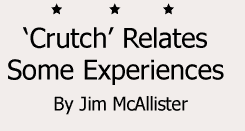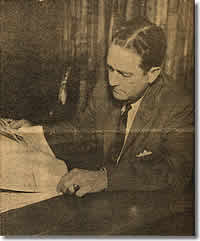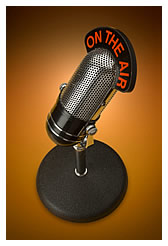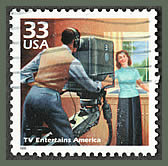Profiles

 Charles H. Crutchfield, of course, is now nationally known as the executive vice-president and general manager of the Jefferson Standard Broadcasting Company.
Charles H. Crutchfield, of course, is now nationally known as the executive vice-president and general manager of the Jefferson Standard Broadcasting Company.
But most people in those parts know Charlie Crutchfield best as the voice of the "Briarhoppers."
Crutchfield today still has a soft spot for the "Briarhoppers." They were his creation. He dreamed the whole thing up and got the group together.
Who can ever forget Hank Warren, Big Bill Davis, Homer (Briarhopper) Dry, Claude Casey, Billie Burton and then later, Whitey and Hogan.
Days of Peruna
 Those were the days in the mid and late 1930s when Charlie Crutchfield was beginning to make a name for himself at WBT.
Those were the days in the mid and late 1930s when Charlie Crutchfield was beginning to make a name for himself at WBT.
He chuckles now about those days with the "Briarhoppers." They were on one hour a day, six days a week with Peruna and Color Back as the sponsors.
Thousands have heard Crutchfield intone with the resonant vice: "Put a few drops on your hair ..."
At that time they were giving away photographs of the "Briarhoppers" and New Testaments to persons who sent in Peruna box tops. Crutchfield said they averaged 18,000 Peruna box tops a week.
Cannon Requests
"Charlie Cannon of Concord used to write me regularly and request a song," Crutchfield recalls.
Looking back over his 33 years in broadcasting, Crutchfield related the following incident:
"It was a Sunday afternoon back around 1933 or 1934. I was a brassy young announcer with a lot of enthusiasm and not much more going for me, when we got wind of a wedding between the two oldest ex-slaves in the county - 97 year-old man and a 92 year-old woman - both of them getting married for the first time.
"It being Sunday, and little else happening, the spare engineer and I decided to cover the event. Loading our equipment we hopped in the car, a 1929 T-model ford, and headed down country toward Pineville.
Some Complications
"What we thought would be a rather routine assignment suddenly developed complications when the Board of Deacons--after a hurried huddle--decided that it would be sacrilegious to broadcast from the church. Things were looking pretty black until the chairman of the board, a lean, white-headed old fellow, admitted that he 'jest mite' crack one of the windows for a little consideration.'
"Poorer by two dollars, I climbed a plum tree outside the window, stuck the mike inside and aired the entire ceremony. Then I jumped in the car, pulled up to the front steps, jumped out and told the couple that this was the official wedding car.
"They climbed in and we got an interview with the couple - both of them toothless and both of them grinning from ear to ear. When I asked the groom what his plans were, he came our with a classic: "I'm gonna quit running 'round, settle down and start raising a big family.' An, you know, after talking with that old buck, I wouldn't be a bit surprised if he did just that."
The Rebel Yell
Several years later Crutchfield said he had eight Civil War veterans in the studio to record the Rebel yell. "the youngest on must have been at least 90 - and all of them were full of pep and vinegar," he said.
"Right after they had demonstrated the yell for the radio audience, one old fellow got so excited that he jumped up and screamed 'shoot the damn Yankees.'"
Charles Crutchfield was born in Hope, Arkansas, July 27, 1912, the son of a cotton broker. When he was eight years old the family moved to Spartanburg, SC and there young Charlie grew up and went to high school.
His voice changed when he was 10 years old and Virgil Evans, the owner of the radio station WSPA, told him some years later that he sounded like he had a radio voice.
Meal Ticket
"Mr. Evans sent me a message that he would let me announce a few records on the air - well, I was on Cloud 9." Crutchfield declared. Young charlie was so ecstatic that he worked the first six months without pay.
"Later they gave me a $10 meal ticket a week as my salary," Crutchfield recalls. "In those days you could hardly eat $10 a week in groceries."
After that, Crutchfield said, it seemed like he got fired from. every radio station in the South. "Oh, I was single and just a wild buck and sometimes I just wouldn't show up when I was supposed to," he smiled puckishly.
He worked at WBAM (now WBIG Greensboro; WIS Columbia, S. C.; WRDW Augusta, Ga.; WSCS Charleston, S. C.; WFBC Greenville, S. C.; and then he came to WBT in 1933.
WBT His Goal
"WBT had always been my ambition," Crutchfield went on. "I had been coming up to Charlotte every six months or so for auditions."
In those early days Crutchfield, Clair Shadwell and Lee Everette were the announcers. Everette was also the program director.
WBT was the truly "big time" radio station in the South in those days. It was affiliated with the CBS network and the station even had its own orchestra.
At that time WBT was feeding what CBS called its "Dixie Network" and one of the shows was called the "Dixie Mammoth Minstrels." Crutchfield was the announcer for this show sponsored by the Pure Oil Company.
In 1935 Crutchfield was named program director at WBT, but he continued his full announcing shift.
Sports Announcer
Crutchfield was the first sports announcer at WBT. In 1936 he went to the Southern Conference football meeting in Richmond to plead the case of broadcasting football games on radio. Crutchfield got Wallace Wade to run a little interference for him and the Conference voted to experiment with the broadcasts for one year.
That season Crutchfield broadcast all of the Duke games. He recalls that Wallace Wade Jr., helped him with the first game. "I remember that the game wound up with young Wade doing most of the talking," Crutchfield chuckled. He continued to broadcast the Duke games for the next eight years. Crutchfield had played football in high school, so these broadcasts were right down his alley.
WBT was the first station in the South to broadcast American Legion Junior Baseball games. The year that Gastonia played San Diego for the world's championship at Spartanburg. Crutchfield was at the mike. He recalls that it was quite a thrill to go back to his old hometown as a successful radio man.
In 1945, at the ripe old age of 33, Charles Crutchfield was named general manager of WBT. He had the distinction of being the youngest man to hold such a post in the nation.
During the next decade, under Crutchfield's guidance the station experienced phenomenal growth. The primary reason, of course, was television.
Crutchfield said at first they were discouraged about TV. CBS told him that it was doubtful that the coaxial cable would be as far south as Charlotte by 1960 — if ever.
TV In '49
WBT went on the air with television in 1949. "It amazed me the way our people adapted to television," he said.
Crutchfield leaned back behind the desk in his handsomely-decorated office and rubbed his chin: "This is a job that I don't see how any one man can handle — you've got all the problems of any other business, plus you've got the fact that you're controlled, to a degree, by the federal government."
One of the most interesting chapter's in Charlie Crutchfield's life was his visit to Soviet Russia in 1957. He was one of 46 men from the United States and Canada touring the land of Communism.
Three men were asked by the U. S. government to gather special information while they were In Russia —and Crutchfield was one of these. Our government wanted to know about the Reds' radio jamming stations. Crutchfield said it is still a secret how he managed it, but he got inside one of the jamming stations and even made some pictures. He said the famed correspondent Daniel Shorr helped him in this project.
Crutchfield gained nation-wide notoriety when he returned from Russia and predicted that Stalin's body would be removed from the Lenin tomb.
Stalin's Body
He said when the group talked to Bulganin, the former premier, he told them that Stalin's family had been trying to get them to let the body be removed and buried in the family plot. Crutchfield said he immediately saw through this as a build-up for the removal of Stalin's body.
The Charlotte broadcasting executive found the average Russian very friendly. "They were inquisitive — they wanted to look at and feel our clothes," he said. "They wanted to see our fountain pens and watches."
Crutchfield said most of the Russians he saw were poorly dressed and-the buildings, even the new ones, are poorly constructed and actually falling apart.
He was very favorably impressed by the subway system in Moscow, which is located 200 feet underground, has restaurants "and is kept spotless."
Elvis Too
Crutchfield went into quite a few stores and found American phonograph records in demand. "They even had some Elvis stuff," he smiled.
"You always knew you were being watched, but you couldn't prove it," he went on. At one time Crutchfield said he wasn't feeling too well so he called the embassy doctor, who said it would be about 15 minutes before the medicine would get there. "In about two minutes," Crutchfield said, "a man knocked on the door and said they knew what I needed—and presented me with the medicine. So you see somebody was listening in on that phone conversation."
He laughed over the fact that customs made a great issue over the fact that they didn't go through their luggage. "But I know that they went through our luggage at the hotel every day, because I placed some things in a way that I could tell if they were moved," he said.
Crutchfield said there were two things they almost never saw in Russia— automobiles ("there were a lot of trucks") and military planes in the sky.
Color TV?
The Russian broadcasting people were fascinated when Crutchfield showed them how Americans work on their TV cameras. "They said they had color TV far superior to ours, but when I asked to see it they didn't produce anything," he continued. "I found that our video tape was completely new to them."
Crutchfield has developed some pretty strong opinions about Russia and the Communists since his visit to the Soviet Union. "When you have a known enemy with a rifle, you're a fool to face him with a BB gun," says he. "Right now we're facing him with a BB gun."
As a remedy, Crutchfield advises: "We should get on the air on a national level--cancel whatever programs we have on--and explain to the public what is happening to pull this country apart: tell them how the Communists are infiltrating free world countries."
Crutchfield feels that maybe the United States has done too much to try to Americanize the so-called "emerging" nations of the world. "We should encourage these people to build more of their own churches and do things more their way, rather than try to convert them to Americans," he said.
"We've got the brains in our country to sell soap," he continued, "and I know we've got enough brains to sell Americanism. We can out-propagandize them--but I'm afraid we're on the defensive now."
Crutchfield has taken a big step toward putting across his ideas on Communism with the pioneering and award-winning radio program, "Radio Moscow" and the TV show "Land of the Free."
Yes, sir, "Crutch" has come a long way since the days of Peruna and Color Back.
Reprinted with the permission of The (Concord, N. C.) Daily Independent. Copyright © The Daily Independent. Clipping provided by Don McDaniel.



 Charles H. Crutchfield, of course, is now nationally known as the executive vice-president and general manager of the Jefferson Standard Broadcasting Company.
Charles H. Crutchfield, of course, is now nationally known as the executive vice-president and general manager of the Jefferson Standard Broadcasting Company. Those were the days in the mid and late 1930s when Charlie Crutchfield was beginning to make a name for himself at WBT.
Those were the days in the mid and late 1930s when Charlie Crutchfield was beginning to make a name for himself at WBT.

